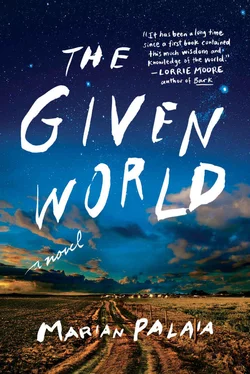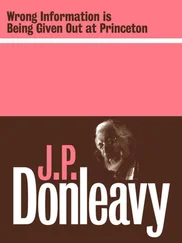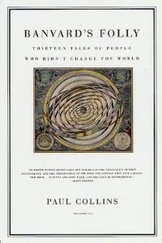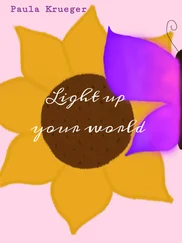“Nope. She lives with her sister.”
“Why?”
“Long story. Boring, too.” He laughed, but it didn’t sound the same as it had before. It was quicker, closer to choking, really, than laughing. He lifted the grocery bag out of my hands and headed toward the truck. “Time to get back to work,” he said. “We’ve probably messed around just long enough.”
“Long enough for what?”
“Hit some traffic. Get some second calls.”
“Calls for papers?”
“Exactly.” He looked sideways at me out of his good eye. “You’re a smart cookie, aren’t you?”
“I don’t know about that,” I said. But it was nice, him saying so.
He set the bag on the floor of the truck and asked me to wait while he ran into his apartment for something. He was gone about ten minutes, and when he got back, we sat while he rubbed his eyes and adjusted the mirrors four or five times.
“Sleepy,” he said. “I always get sleepy right about now.” I was wide awake, but then, I figured, I was way younger, and there was so much to look at.
When we finally started moving, I asked him, “So how come everyone calls you Primo?”
“It means cousin, kind of, or first, I guess. I was born first. I have another brother named Anthony. Antonio, actually. After my dad.”
“Your dad named both of you the same thing?”
“Yeah. He would have named us all that, even the girls, but my mom wouldn’t let him.”
“She wouldn’t?” I said. Primo looked at me, his eyebrows raised. I couldn’t help but grin.
“Smartass.”
I nodded. “So I’ve been told. What do they call the other Anthony?”
“Tony.”
“Oh.” I was disappointed, thinking maybe there was another word like Primo for a second son with the same name.
“Nope,” Primo said. “We weren’t going to call him Segundo. That would be as bad as calling someone T.B.” When I laughed, it felt surprising and familiar, like something I’d done when I was young.
“What should I call you?”
“Primo. That’s what my posse calls me.”
Posse. I waited.
“I’ll let you in if you’re lucky. Keep your nose clean.”
“I’ll do that.”
I told him my real name. We were at a light. It turned green but he didn’t go right away. I looked, and his eyes were closed and his head leaned back against the metal grate behind him. Someone honked. His whole upper body jerked, and he moved his foot from the brake to the gas pedal.
“I like it,” he mumbled. “But I was sort of getting used to Tinker Bell.” Just as though there had been no break in the conversation, and he hadn’t fallen asleep at an intersection.
“I answer to pretty much anything,” I said, wondering if sleep-driving was a common occurrence among newspaper drivers, or if it was a special talent only Primo possessed.
• • •
I kept sleeping in my car, because I was not ready to give up the ocean yet, knowing the sun did in fact exist here and that it wasn’t so terribly hard to find. Besides which, I didn’t really have any place else to go. Primo showed me where the Y was in the Sunset District, and introduced me to a girl who worked the desk in the evenings and would let me in so I could shower and wash my hair. He found me most mornings, picked me up so I could ride around with him.
One of the kids called in sick a week or so after Primo and I met, so we threw his two routes: 170 papers on six or seven blocks. I already knew by then the basic process of folding and banding, and Primo taught me how to wing the papers, sort of like a Frisbee, snapping my wrist so they’d go where I aimed them, and sometimes they did. The buildings with open entryways were the easiest shots, of course, since there was nothing in the way. Gates were harder, but they had their openings too. I began to see the spaces under them, at the very top and between the bars as their weak spots, places to attack. Primo drove both sides of each block, calling off addresses, and I threw. If a gate came all the way to the bottom or the bars were too close together, I jumped out of the truck to fit the paper through one gap or another. When there were several tough ones in a row, Primo drove slowly alongside as I trotted down the fog-damp sidewalks, arms loaded, feeling like a one-girl assault force.
I was concentrating so hard I didn’t even notice the sun. Primo had to point it out to me.
“Check it out,” he said, motioning with his chin. I stopped dead, screeching to a halt, looking a lot, I bet, like Wile E. Coyote.
“Holy shit,” I said, throwing a paper straight up in the air.
Primo shook his head. “You can’t swear around me like that. My virgin ears.”
“Sure.”
When we were done, he gave me five dollars.
“For what? No.” I handed it back.
“Yes.” He stuffed the bill into the hip pocket of my blue jeans, caught my hand, and held it to keep me from reaching in to get it out. When I gave up and said okay, he let go.
At last call he dropped me off at my car. I thought about taking a nap, but the sun was too bright and tempting, so I went to the beach. I was always surprised at how empty it was. That day only a few people strolled down by the water; one guy throwing sticks for his dog, a big black Lab who bounded into the surf over and over, came out, shook the water off and stood panting and shivering until it was time to rush the waves again.
I sat on a piece of wood that looked a lot like the burnt remains of a railroad tie, wondering how it could have gotten there. I remembered walking on the railroad tracks at home with my brother or with Darrell, or alone, thinking I might walk those tracks all the way to the coast, but when it came time to go, it was the Greyhound that took me. I tried to imagine what it would be like to still be there but couldn’t wrap my brain around the baby, or the gone-away boys; anything I imagined about home at all would probably be just another lie I knew better than to tell myself. The only things I could picture clearly were Mick’s bedroom, the kitchen, and my dog Cash, who had never chased a stick into the ocean, and never would.
Later, when the fog started to roll in, I drove around until I relocated a library I’d been to once before. I prowled the stacks, feeling thiefish, like I meant to steal something, though I knew I didn’t. I asked the librarian if I could check out a book, but she asked for my address and I didn’t have the presence of mind to make one up. When I left it was with — inside my wolf sweatshirt— A Separate Peace , a book I’d loved in high school and would bring back to the library as soon as I’d read it again. I could still so distinctly see one image from it, of a boy standing on the limb of a tree — a silhouette against the sky — and then falling.
Later that week, Primo invited me over for dinner. His place was small and there wasn’t much in it, but it was comfy enough. There was one real bedroom, a living room, and a kitchen with a little closed-in porch behind it. The porch had its own door to the outside: steps leading to a tiny yard full of weeds and ornamental flowers and plants gone wild. I was particular to the bougainvillea and its papery petals that came in so many outlandish pinks and reds and oranges; I’d seen them all over town. “Is that the official plant of San Francisco?” I pointed to a red one near the back, an especially unruly one that had climbed up and over the fence. Like it was trying to escape.
“I don’t know. Maybe?”
“I see them everywhere,” I said.
“I guess I don’t,” Primo said. “Maybe I should pay more attention.”
“SOP,” I said. “Looking at stuff.”
“Gotcha.” He patted me on the head. “I’ll give that a shot.”
He cooked rice and beans and pork chops, and we sat at the kitchen table to eat. Primo drank three Tecates with his dinner, and I drank a sweet Mexican soda. A couple of days later I met him at the apartment for lunch, and he ordered from a tamale place down the street. I had never eaten tamales before, and was fascinated by the corn husks and the consistency of the cornmeal, the amount of work that obviously went into the process.
Читать дальше












